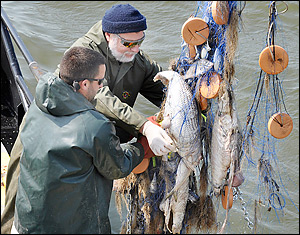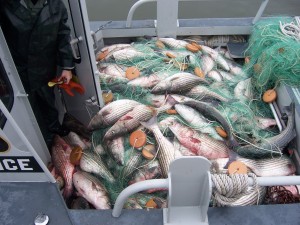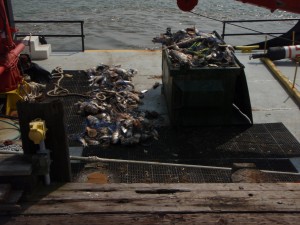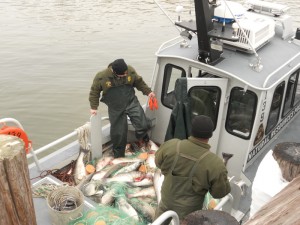 I’ve had my share of embarrassments in recent years. There was the time at a bluegrass show when, immediately after performing “How Many Biscuits Can You Eat,” I choked on a country ham sandwich. I’m the guy who tripped over the curb a while back as I stepped up to shake hands with the Vice President of the United States. I’ve fallen out of boats, pitched backward off barstools, stumbled up escalators, tumbled down stairs, and spilled enough drinks at public dinners to float the Oxford-Bellevue Ferry. Some of my hall-of-shame moments have been painful, and others downright funny, but there’s nothing remotely entertaining about my most recent embarrassment. In fact, everyone in Maryland shares my latest shame. Last week, Chesapeake Bay anglers found and reported another fourteen hundred yards of illegal gill net containing more than three tons of dead and rotting fish. Add another nickname to the list that includes The Free State and The Old Line State: Maryland – The Poaching State.
I’ve had my share of embarrassments in recent years. There was the time at a bluegrass show when, immediately after performing “How Many Biscuits Can You Eat,” I choked on a country ham sandwich. I’m the guy who tripped over the curb a while back as I stepped up to shake hands with the Vice President of the United States. I’ve fallen out of boats, pitched backward off barstools, stumbled up escalators, tumbled down stairs, and spilled enough drinks at public dinners to float the Oxford-Bellevue Ferry. Some of my hall-of-shame moments have been painful, and others downright funny, but there’s nothing remotely entertaining about my most recent embarrassment. In fact, everyone in Maryland shares my latest shame. Last week, Chesapeake Bay anglers found and reported another fourteen hundred yards of illegal gill net containing more than three tons of dead and rotting fish. Add another nickname to the list that includes The Free State and The Old Line State: Maryland – The Poaching State.
 While that discovery of even more nets is reason enough for outrage, the sixteen tons of poached fish found this year is only a drop in the bucket compared to what has been recovered in the last ten years. The total for the decade is closer to a hundred tons, and that’s only what we might know about. Here’s some simple math: Let’s very conservatively estimate that the poachers harvest their nets five times for every one the Natural Resource Police recover. (The real number is probably closer to fifty.) How does five-hundred tons of illegally caught rockfish in the last ten years grab you? How about the genuine possibility of five thousand tons? If that’s the real number, we can forget other legitimately concerning issues like culling by North Carolina trawlers, off-shore fishing in the Atlantic Ocean, or the over-harvest of menhaden. If Marylanders really want to know what’s wrong with the East Coast striped bass population, we need only look to our own backyards: Maryland – The Poaching State.
While that discovery of even more nets is reason enough for outrage, the sixteen tons of poached fish found this year is only a drop in the bucket compared to what has been recovered in the last ten years. The total for the decade is closer to a hundred tons, and that’s only what we might know about. Here’s some simple math: Let’s very conservatively estimate that the poachers harvest their nets five times for every one the Natural Resource Police recover. (The real number is probably closer to fifty.) How does five-hundred tons of illegally caught rockfish in the last ten years grab you? How about the genuine possibility of five thousand tons? If that’s the real number, we can forget other legitimately concerning issues like culling by North Carolina trawlers, off-shore fishing in the Atlantic Ocean, or the over-harvest of menhaden. If Marylanders really want to know what’s wrong with the East Coast striped bass population, we need only look to our own backyards: Maryland – The Poaching State.
 As shamed as most of us are by the poachers in our state, can you imagine how the decision-makers within our Department of Natural Resources (DNR) must feel? All soldiers know that what happens on their watch is ultimately their responsibility, especially when it happens again and again. There’s obviously more to managing natural resources than caring for one species, but nothing gets more attention from the citizens of Maryland than the plight of our state fish, the striped bass. As poachers deliver one embarrassing slap in the face after another, fisheries managers have few ways to fight back against the public relations nightmare. About the only weapon in their arsenal is repeated announcements that the poached fish recovered will be subtracted from the commercial quota. Since poachers sell their fish on the black market anyway, they could care less. Maryland – The Poaching State.
As shamed as most of us are by the poachers in our state, can you imagine how the decision-makers within our Department of Natural Resources (DNR) must feel? All soldiers know that what happens on their watch is ultimately their responsibility, especially when it happens again and again. There’s obviously more to managing natural resources than caring for one species, but nothing gets more attention from the citizens of Maryland than the plight of our state fish, the striped bass. As poachers deliver one embarrassing slap in the face after another, fisheries managers have few ways to fight back against the public relations nightmare. About the only weapon in their arsenal is repeated announcements that the poached fish recovered will be subtracted from the commercial quota. Since poachers sell their fish on the black market anyway, they could care less. Maryland – The Poaching State.
For the most part, the DNR under the direction of Governor Martin O’Malley and Secretary John Griffin has done an exceptional job. They should receive lasting recognition for progressive initiatives such as advances in oyster management and emphasis on aquaculture. The progress they’ve made toward the long-term sustainability of species such as yellow perch and flounder deserves prolonged applause. They’ve turned the Maryland Fishing Challenge into a premier regional event and taken meaningful steps toward getting more children involved in outdoor activities. These are amazing feats when you take into consideration that they are drastically understaffed and critically underfunded. The O’Malley Department of Natural Resources deserves to be remembered for more than gill net poaching. Yet, every net discovered undermines their accomplishments and makes it more likely that the legacy of this administration will boil down to one singular issue: Maryland – The Poaching State.
 Since February 2011, Maryland Natural Resources Police have recovered more than sixteen tons of striped bass from illegal gill nets. Remember the song by Tennessee Ernie Ford? You dig sixteen tons and what do you get? Maryland taxpayers deserve more than another day older and deeper in debt. In the past decade the DNR has spent hundreds of thousands of resource dollars trying to police the gill net fishery. That’s tax money that could have, and should have been spent on more important resource issues. When a fishery can’t pay for itself it becomes nothing more than a welfare program. Do the people of Maryland owe their soul to commercial gill netting? How much more poaching can the Chesapeake Bay tolerate? Maryland – The Poaching State.
Since February 2011, Maryland Natural Resources Police have recovered more than sixteen tons of striped bass from illegal gill nets. Remember the song by Tennessee Ernie Ford? You dig sixteen tons and what do you get? Maryland taxpayers deserve more than another day older and deeper in debt. In the past decade the DNR has spent hundreds of thousands of resource dollars trying to police the gill net fishery. That’s tax money that could have, and should have been spent on more important resource issues. When a fishery can’t pay for itself it becomes nothing more than a welfare program. Do the people of Maryland owe their soul to commercial gill netting? How much more poaching can the Chesapeake Bay tolerate? Maryland – The Poaching State.
The only possible solution is an outright end to commercial gill netting in the Chesapeake Bay. If nets are outlawed, only outlaws will have nets. That’s real progress because a gill net isn’t something you can hide in a pocket or under the dash. Outlawing nets will make poachers markedly easier to find and identify. Since gill netting takes place in the dead of winter, Natural Resource Police could easily recognize the poachers because there will be fewer commercial boats on the water. How much more money should be spent maintaining the most embarrassing fishery on the East Coast? How much longer can we put up with the shame of poaching in our state? Enough is enough. Let’s hope our leaders act soon to ban gill nets. That would go a long way towards removing our new nickname: Maryland – The Poaching State.




I’ll have a fishing report up later in the week. I got out tonight and found some topwater action and a good jigging bite in 16 feet. More on that later, just needed to get this one off my chest.
Thanks for getting it off your chest (and many, many others) so eloquently.
I really enjoy reading your stories and reports. I think this is the best one you have written to date on an issue that is filled with emotion for those of us who know what a world class fishery this place could be save the actions of a few. Hopefully there will be action following this latest debacle.
dont forget about that time you went swimming after you backed the trailer off the ramp……….
All I can do anymore is hang my head in disgust. You are right, Shawn, Maryland has become the poaching state and it seems like the O’Malley bunch is powerless to do a thing about it.
It was even worse under Erlich, so I’d say your estimates are low, but you are right that we need action and not rhetoric. The latest I’ve heard is that DNR is considering a GPS tracking device requirement. That would accomplish nothing because the poachers won’t put the devices on their boats. It isn’t the honest watermen who need policing. I wouldn’t have said this two years ago but I now agree that it’s time to get rid of the gill net season.
Thanks for reminding me, Mike. I sure hope you burned those pictures.
Good comments by all here. Much appreciate the time taken to read and respond.
Great article. All of this poaching makes me sick. I hate seeing such a huge waste of fish. As for the some of the cheating watermen…Ban the nets, atleast during the fall and spawn season!
Great article! Could not agree more; END GILL NETTING in Maryland. I’m continuously amazed at how something so simple can take so long!
I hope somebody is listening and gets this in front of the governor. You said it, Mr. Kimbro.
These fish will all be counted. It’s virtually impossible to sell a fish with out a tag in it, especially in this volume. DNR cops are at all of the checking stations that feed into the packing… houses. Yes there are criminals who deploy there nest in illegal ways and they should be prosecuted and stripped of their license. But the number of fish coming out of the bay from commercial fishermen is well documented, far more than the recreational hall. There are bad watermen, no doubt. I spend a lot of time with the good ones. They’re getting screwed from all directions…politically, environmentally and now in the press as they are painted with one brush. When you get right down to it, without them we’d have no local sea food.
We can hope that is true, David but past experience shows us it isn’t. The Feds stepped in to stop black market sales of striped bass two years ago, and rumor has it that they’re still on the case. I believe there are a lot more fish going out of Maryland that are not counted than most people suspect. I agree with you that watermen are getting screwd, but I think almost everyone is fed up with spending money to prevent gill net poaching.
Nice website by the way. Beautiful photos.
I believe I rescued Shawn from that ham sandwich, by the way. I know a great way to get the freshest local seafood you’ve ever had…catch it yourself.
Are you only finding the fish on topwater in the eavenings?I have been out twice this week in the morning scouring eastern bay and between bloody point and poplar and have yet to see any signs of schooling fish or bird actvity.
Yes, right at sunset along shoreline cover, especially where I can find moving water that is 4′ or more. The best spots will be right under your nose.
I THINK THEY NEED TO MAKE THE PENALTIES FOR POACHING STIFFER ALSO,I SAW A REPORT WHERE THEY CAUGHT SOME FROM ROCK HALL AND THEY WERE REPEAT OFFENDERS THE PENALTY WAS HARDLY ANYTHING.
Theft pure and simple. And 60 to 80 % of the oysters in oyster sanctuaries are being stolen too according to a recent article. Theft,Theft, THEFT!
Very well written Shawn. Why do you need two miles of net to catch 300 pound of rock fish any way. BAN THE NETS Speed kills and greed kills
Shawn, I know you have written several articles but I will have to say this one is one of the best. You speak for many of us who would like to see gill nets banned. It sickens me to see all those “DEAD” stripers just going to waste. Thanks for laying it on the line and I sure hope we can get away from our new nickname.
Allot needs to be done and banning of nets would be a great start.The Virgina trawlers,well thats another topic.
Heading out this evening to try some TW spots,hopefully I will have something to report.
Bravo!!! Now if anyone would only listen.
Mike
Great read, Shawn.
Thank you for putting your feelings…and mine….into words.
It is truely embarrassing.
I’d like to add one additional word…..GAMEFISH!
Mark
NC also has issues with commercials, FL had to ban gill nets in the Gulf and Atlantic. The common thread with commercials seems the thinking that “if I don’t get em, some other guy will” and the fish will be killed, regardless. After all, they only live 5 or 6 years. Can this attitude/context ever be changed with commercials?
Shawn,
Another great read, thanks! Has anyone thought of having bumper stickers made up to keep our message in front of the general public? It could say something like, “Maryland – The Poaching State, Ban Commercial Gill Nets and Save our Rockfish.” Just my two cents worth.
Shawn,nice article. Thanks for speaking up. While I no longer live in Maryland, I have a good friend who is a Maryland law maker and another who is an acquaintance. I’m writing both of them today. Hope you don’t mind but I’m referencing your article. Got to start somewhere! Today is the day.
Bill M.
Googled Maryland Poaching and saw this article. Hope everyone does this. It’s time the world knows what’s happening in the poaching state!
Heard about this in Maine and read your article. There are hardly and fish here anymore and I guess now we know why.
I dont understand the rationel of our state government. They want to tax the hell out of for fishing by high license fees, boat registration fees. They want to control every aspect of recreational activity on the bay and its tributaries. But when it comes to actually doing something to help the health of OUR Chesapeake Bay they do nothing. Before we know it, like the sea trout and bait fish the stripers will be gone again…. Too much talk not enough action! WE need to let our state reps. know how we feel! How about it?
Shawn,
Great article. Couldn’t agree more. Stop the gill nets.
i agreeeeeeeeeeeeee. oh and by the way, im 9
I recently tried to report a poacher in MD, I’m from PA, and after the ten minutes it took me to find the number, the women on the hotline were so indifferent to me and obviously felt inconvenienced as to my call thati hung in frustration.
Pete, I’ve forwarded your complaint to DNR. Thanks for taking the time to write.
I do not understand why the weight of the striped bass that are poached per year are not deducted from the commercial yearly allocation. This does not seem like to much to ask. Obviously, poached striped bass are for commercial use why not acknowledge it, other than it would hurt the commercial fisherman who are doing it any how. Well,soon enough we will be back in the 80’s/90’s with no fish to catch. WHAT A SHAME !
I blame the present situation clearly on BOTH the commercial and recreational fisherman’s’ shoulders. 2 fish per day for recreational fisherman you should be ashamed, charter boat captains who also take 2 fish per day shameful (You are commercial fisherman that is why you have a license). You take people out for hire (You get paid by your party, that implies a commercial intent). No Stripers no commercial or recreational striped bass fishing !! I hope I do not have to live thru that scenario again !!!!
Unfortunately, as we all know the only resolution to this situation will occur when the fishery is shut down to all. Hopefully, it will not be to late for the survival of the wild striped bass.
This is a small example of the overall fate of all our national and state fish and wild life resources controlled by DNR, At a meeting held at a local high school in Western Md. I asked a question to the head of DNR about how can you manage the waterfowl so well for the people who come from DC, but your answer for our deer population problem is to bring in sharp shooters? that was opposed by so many but failed to stop it. Now for 44 years I have seen how this fishery have been on this roller coaster of those who are suppose to manage, first they are not controlling the harvest of menhaden so strike #1 for stripers, you can respond faster if you would engage the public by getting on board with a volunteer or paid water watchers no! strike #2 It might not seem important to DNR that the spawning stripers and juveniles need clean water and a start would be to plant that same grass used for lawns along run offs and water shed areas next to farms this would reduce the amount of nutrients entering the marsh and rivers leading to the bay, so to suggest that this will solve all of our problems? no it has to start some where and saving a vital resource should overshadow politics, favors, and money, and lack of vision for the future, #3?